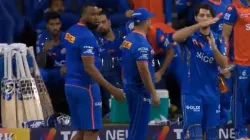MI vs CSK: Why were Mumbai Indians not allowed to take strategic time out? Here's what the rule says
There were some bizarre scenes at the end of the 15th over of Mumbai Indians' innings when the support staff stepped on the field for the time out. But the fourth umpire didn't allow them and asked to leave the field. Why they were not allowed to take the time out. Know the reason here...

Mumbai Indians succumbed to their fourth defeat of IPL 2024 on Sunday (April 14) losing to Chennai Super Kings (CSK) by 20 runs at the Wankhede Stadium. They couldn't chase down the target of 207 runs despite Rohit Sharma scoring a century and batting through the innings. The high-voltage encounter also witnessed a major controversy with the hosts not being allowed the take the strategic time out at the end of the 15th over.
There were bizarre scenes at the MI dugout when head coach Mark Boucher, batting coach Kieron Pollard and Tim David stepped on the field assuming that the time-out has been taken. But the fourth umpire asked them to go off the field with the home team seemingly not pleased with the umpire. MI needed 75 runs off 30 balls and lost the wicket of their skipper Hardik Pandya on the third delivery before the time-out was eventually taken in the middle of the over. Boucher and Pollard were evidently not pleased as they were seen gesturing towards the umpire two balls before the end of the 15th over regarding the time out but the umpire still didn't allow them to take it.
What is the actual rule regarding the strategic time-out?
For the unversed, the strategic time out is allowed for the fielding team from over 6 to 9 while the batting team can take it from over 13 to 16. Now according to the IPL playing conditions 11.6.5, each time out has to be called either by captain or the batters at the wicket notifying one of the two on-field umpires or the fourth umpire. Also, the umpire has to be told about it before the bowler delivers the final ball of the over. Also, if the captain or the batter doesn't elect a specific over for the time out, the umpire will officially take it at the end of 9th and 16th over. Another most important thing is, no other team representative can request the time-out other than the captain or the batters at the wicket.
Here's what the clause 11.6.5 says: "Each time-out should be called by only either (a) the captain of either team or (b) the batter at the wicket (as appropriate in accordance with clause 11.6.3 (a) and (b) respectively) notifying one of the two on field umpires or the fourth umpire, in each case before the bowler starts his run up to deliver the final ball. Any notification once the bowler has started his run up or if he has no run up, his bowling action will not be valid and the captain will be asked if he wants the time out to take place after the end of the following over. If either the fielding captain or the batter respectively does not make an election, the umpires will call the time-out at the end of the 9th and 16th over respectively.
"For the sake of clarity, no other team representative is permitted to advise or request a time-out other than the captains of either team or batter at the wicket."
In this case, Mumbai Indians coach Boucher and Pollard had informed the umpire of the time out and not Hardik Pandya who was in the middle. It should've either been Hardik or Rohit telling the umpires that they required time-out at the end of 15th over. But that didn't happen and hence, the umpire didn't allow MI to take the strategic break then.
